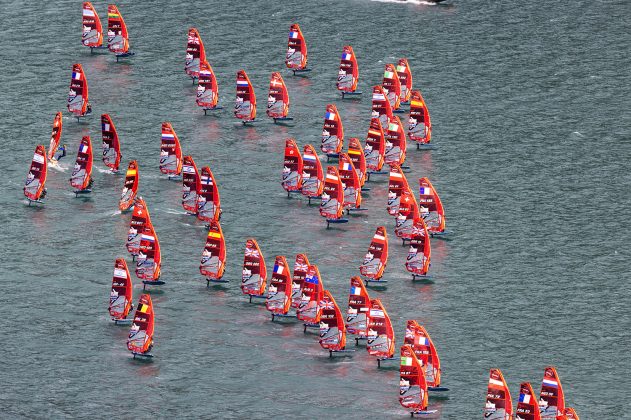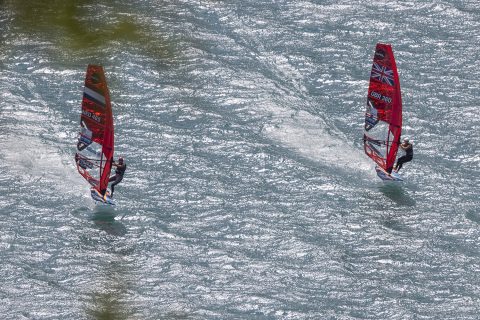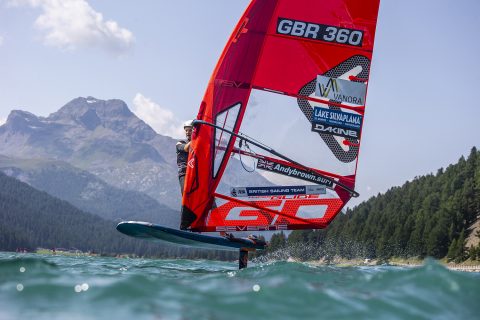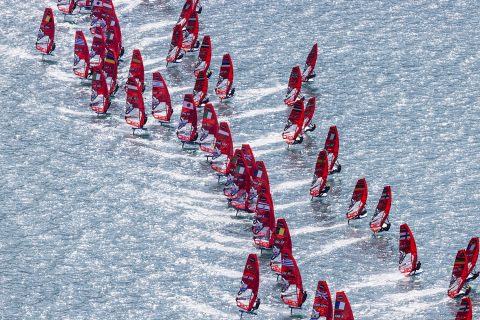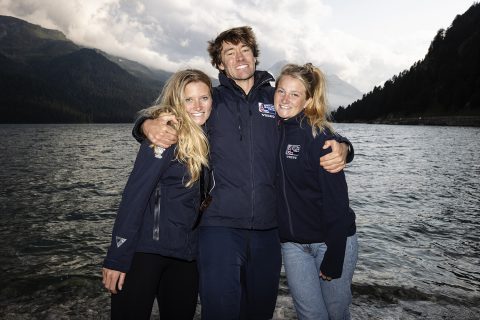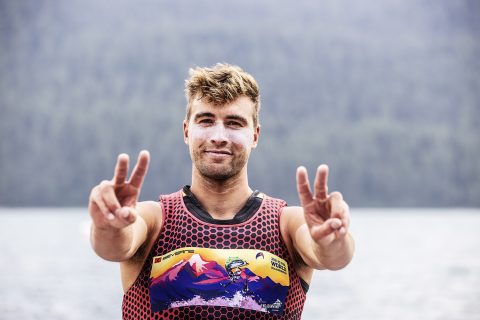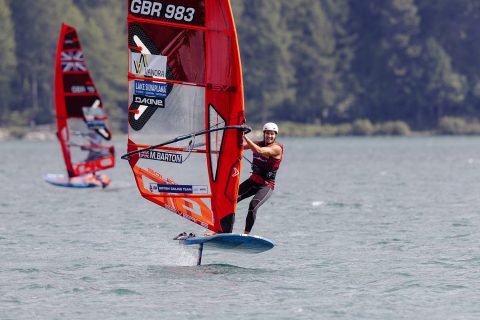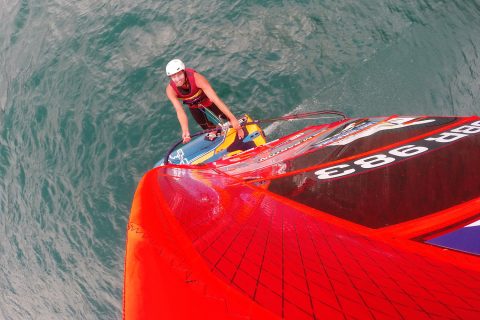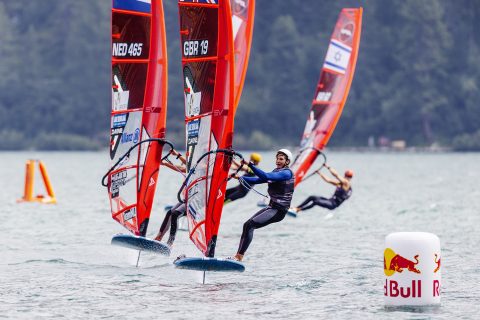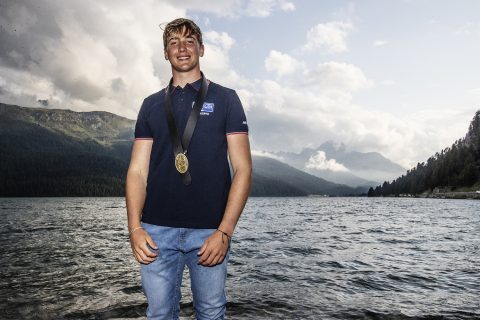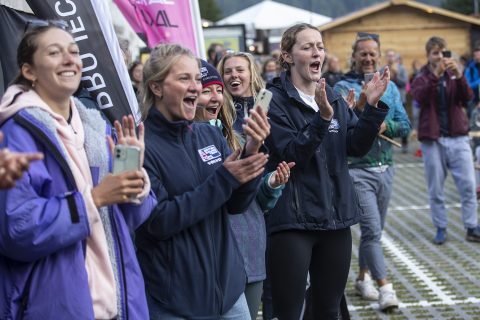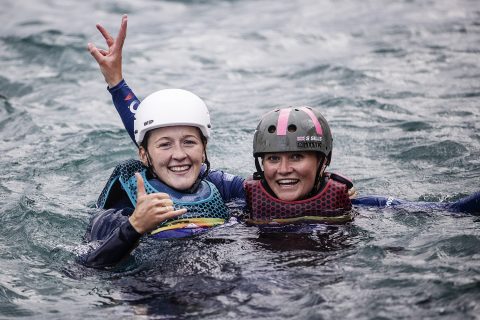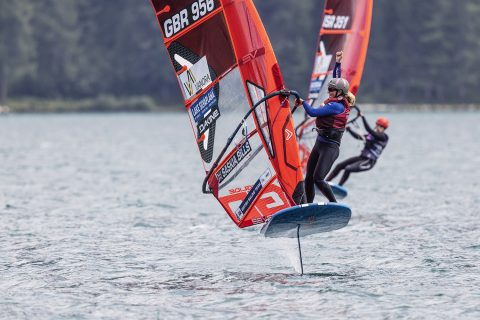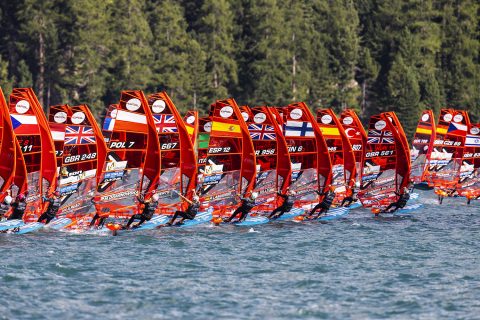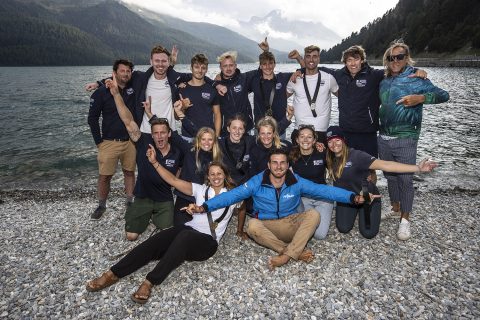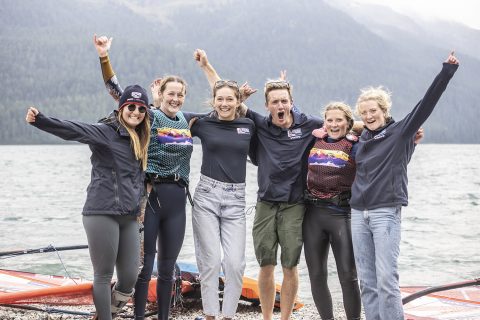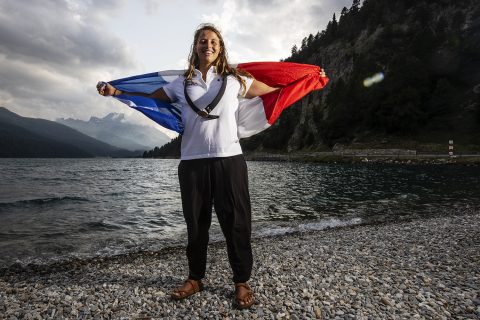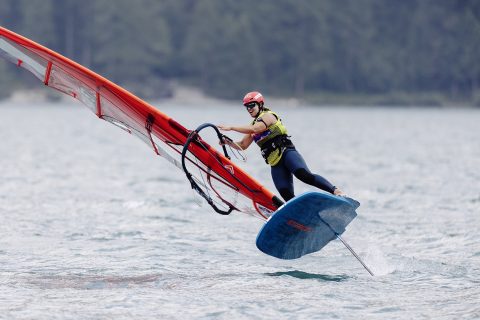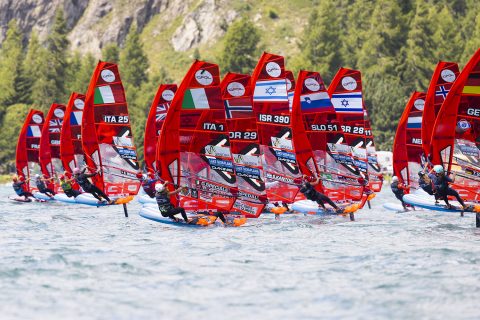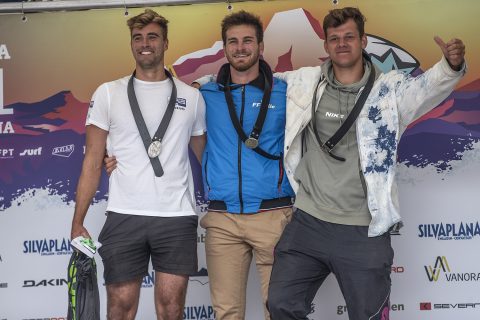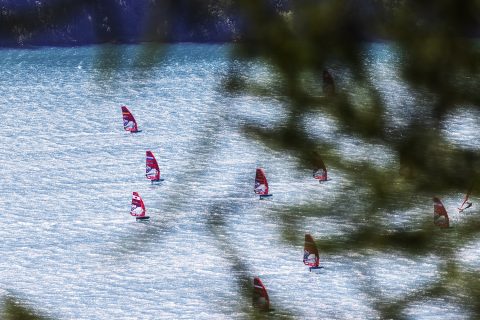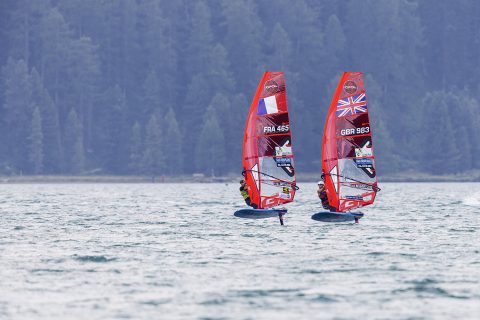The British Sailing Team scored incredible success at the iQFOiL world championships in Switzerland, bagging a staggering half of the top eight men’s positions and second and third in the women, as well as the world under-21 men’s champion title. Top master, Guy Cribb, was also in the thick of the action and gives us his take on some of the team’s performances, while we also hear from medallists, Matt Barton, Finn Hawkins, Islay Watson, Saskia Sills, Hélène Noesmoen, Nico Goyard.
Words: Guy Cribb, Matt Barton, Finn Hawkins, Islay Watson, Saskia Sills, Nico Goyard and Hélène Noesmoen // Photos: John Carter
PRAISE YOU LIKE I SHOULD – ANDY BROWN!
- Race to the finish
Guy Cribb – “With over 90 kg of strength and a decade of foiling development and experience, it was little surprise the 2020 Foil World Champ and PWA 2021 current tour leader Nico Goyard won five of the seven course races at this world championships.
- Andy Brown
But no one (other than the British Sailing Team) would have betted on Andy Brown at 80 kg being the only other competitor to win gold fleet races, taking two bullets. In fact, if it were not for Andy’s two very costly crashes when leading other races, he would have won more from Nico and have shared one of the top two seedings for the medal races.
Nico, Matt Barton and Luuc Van-Opzeeland were deserved champions, no question, but my money was on Andy Brown to win the medal races. And indeed, he was leading at the first mark of his semi-final, but some uncharacteristic mistakes saw him eliminated from the final and a mere 6th in the world!
- Big Fleet action
From all the competitors at the iQFOiL, World Championships, to me, Andy Brown was a star of the show. Defying his slighter weight and height, he showed that with incredible focus and skill, he is a massive threat for the world title. Bearing in mind that most races were full power 15-23 knots on 9.0m sails, world get ready for when its 8-15 knots, then you will truly meet Andy Brown.
SAM SILLS
- Sam Sills and his sisters
In contrast with Andy, Sam Sills saved his best racing for the medals. He’d worked his way up from 25th on the grid to the top 12 with two solid days of racing, and his energy in the final was to behold, comfortably winning the quarter finals. Sadly, in the semi-finals, a controversial starting incident left Sam behind the fleet and his medal race was over despite his adrenaline still pumping.
Andy and Sam finished 6th and 7th in the world, results which history won’t remember, yet the intelligent fury they demonstrated on the racetrack will never be forgotten by their fellow athletes and they are a massive part of the British team, backed up with the muscle of Henry Bloodworth and James Hatcher.
- Matt Barton
MATT BARTON
But at the front of this incredible team effort is the amazing Matt Barton. I can’t write this without the hairs on my arms rising. Watching Matt develop in the last year on the water has been fascinating. He looks like a world champion when he’s sailing and is an inspiring humble natural leader of the team! Take a look at his results from the past three internationals – 4th, then 3rd, and now 2nd in the world. He was utterly brilliant in this regatta and it looked like he was just cruising.
I watched him in an early qualifying race move up from about 30th at the first mark to 4th by the finish. I don’t think anyone else made such a recovery at this level, and after that he made sure his results were cold bloodily consistent. But he’s no killer at heart, Matt is the team member who is packing the van, driving everyone around, making sure everyone is doing good. Between winning races, I saw Matt spending plenty of time chatting to tourists on the beach who were asking him basic windsurfing questions, not realising he’d just come ashore from winning a race.”
- Matt Barton
Matt Barton – “Going into the competition I knew my speed was good enough to challenge for a podium, but with such a big fleet I would have been pleased with a top five finish. After day 1 all I was thinking about was consistency. With such a large and competitive fleet if you messed up it was very easy to lose places, so I just looked to keep things safe. If you were first or even in the top five to the windward mark, racing wasn’t too stressful. However, if you arrived around 15-35 it was an intense scramble to get round with so many sailors gathering in that one spot.
On the final day I had an opportunity to win the event or to slip down to 8th position. As the top two racers progress from the semis through to the final I knew I had to go all out to make it. On the final race it’s a lot simpler, just focusing on three other boards and fortunately it went my way. I would say I felt the pressure and stress of the event, but I wouldn’t say I felt too nervous. I just saw it as an opportunity.
As the finals are quite short (5 minutes long), the board-on-board tactics become important. Positioning and accurate execution was crucial as everyone in that top 12 had the potential speed to win if you messed up. I was relieved to get into the final and then there was the excitement to be in with an opportunity to claim gold.
- Matt cruising
In the final as we got to the gate, I noticed the pressure was a little more on the right-hand side of the course, however, you would have to do an extra tack. I chose the simpler option of trying to beat the boards around me and Nico made a gutsy call. Credit to him to send it the opposite way and it certainly worked for him. I had pumped most of that port layline just to sneak round the mark, so my body was shaking from the exertion at the windward mark. I knew Nico had a little more downwind pace than me when it was windier, so I knew I had to do all I could to try shut the door on him.
Nico sailed a fantastic week and proved across the series and the finals to be a worthy winner. I am looking forward to getting back training to see if we can close the gap on him before the Europeans in Marseille”.
Guy Cribb – “Matt is second in the world to Nico Goyard. To put this in perspective, the PWA World Champion Matteo Iachino finished 30th. Other esteemed PWA riders scattered the top 50. If we had a prestigious PWA World Tour ahead, as we did prior to Covid, every brand in the world would be looking to sign Matty Barton. He is second in the world only to THE most talked about man of the moment, Nico Goyard.
- Finn Hawkins
FINN HAWKINS
And it doesn’t end here, it’s just beginning. Finn Hawkins was crowned under
-21 world champion, and was the only U21 in the medal races. Like a missile for speed, but with occasional teenage explosions, Finn is getting ready for Paris 2024 as much as his fellow teammates are. With a youthful attack from James Faley and Max Beaman, who was one of only two 18-year-olds in the world’s top fifty, this younger half of the British team are pushing!
Finn Hawkins – “The lead-up to the world championships involved sitting many A-Level assessments, a long winter training camp in Lanzarote and a lot of training in Weymouth. Covid-19 made trips abroad very difficult, so I was very reliant on the British team being fast to improve my speed. I was very apprehensive before the world championships as I had no idea whether I was going to be slow or fast compared to the rest of the world, which made for a great surprise during the training days when the whole of the British squad seemed to have good speed!
- Finn Hawkins
I wasn’t too focused on where I was in the U21, because I knew if I made the medal race, all the medals would be won on the last day anyway. The racing itself was so much fun. The new option of being able to start on either tack was super interesting tactically, but mainly lead to some super close crosses where you’d be inches away from the back of another competitor’s board and then make the next cross where someone would be inches away from your board. Some riders, however, weren’t quite as lucky to have near misses and had head-on collisions which made a loud bang as their foils and boards collided which caused some injuries but none too major thankfully.
Going into the finals was so nerve-racking for me as it was the first medal race I’ve made in iQFOiL, let alone at a world championship. I had already won the U21 title, which took some pressure off and it was nice to qualify 12th because the worse I could do was finish in the same place. This helped a lot going into the quarter finals to keep an attacking mindset for the race. The medal race was super intense and the tensions were high, I had a good start and rounded the first mark in 3rd, from then on it was about defending my position to the 4 other guys trying to make it through to the semi-finals. Thankfully the rest of my race was clean and I held on to the 3rd place when I crossed the finishing line! I was so ecstatic to make it to the semi-finals as I secured a top 8 result.
It felt amazing to be the U21 world champion, after racing against a tough fleet. Also, I was delighted to receive my A-Level results during the week, which secures my future education. I have ideas on how to improve and I will be implementing these as soon as possible and hopefully I will be competing at the front with the top guys soon”.
- Plenty to celebrate at the prize giving
WOMEN
Guy Cribb – “And that’s just the men. In the women’s fleet, the British team were second and third in the world, thanks to the efforts of Islay Watson and Saskia Sills, with neither counting any results outside of the top six throughout the week in an 80-strong fleet, and all Brits finishing in the top thirty in the world. To put this into perspective, our greatest female windsurfer of all time, PWA darling and superstar freestyler/ wave sailor and racer, Sarah-Quita Offringa, only finished 30th overall here.
- Islay and Saskia celebrate
ISLAY WATSON
“I think the incredibly strong performance from the whole of the British team shows how hard we had worked to prepare for this event. We have a great program of support and coaching behind us and it shows.
It was a huge step up from any foil racing I had done previously. A start line with more than 70 people on foils is a very intimidating place to be, and even though I felt very well prepared, I was still incredibly nervous lining up to start the first race amongst all that chaos.
In the medal race I knew I didn’t have much to lose and I just had to send it hard and see what happened. I tried to stay calm and race it like any other race, and in the end, it paid off.
I finished the event in 2nd which was a great result for me considering the strength of the field and it was even sweeter seeing Saskia, my teammate, cross the line in 3rd and share the podium with her. We have worked so hard all year for this event and it was worth it in the end”.
SASKIA SILLS
- Saskia makes the final
“My goal was to make the top 15. It was my first iQFOiL competition where I could sail all the races (I did the international games in Garda last year, but I was recovering from a year of illness) and so I wanted to keep my expectations high but also realistic. Silvaplana is a fantastic venue. It’s super beautiful as well as being windy & sunny – what more could you ask for!
I was pretty blown away by the thrill of the starts. These were the biggest start lines I’ve ever raced in, which was a bit of a shock for me. And then the level of the fleet… wow. You could really feel the number of hours that everyone had put into the sport. It takes so many hours to get to the point where you’re not crashing every five minutes and everyone competing was at a level where they were pushing for the top places. The starts, crosses, and mark roundings were so insane! I had one race where I messed up my lay line a bit and that cost be about 50 places…!! It was full power during every single race.
I was so happy and relieved to make the medal final. As I crossed the line in the semi–finals the whole crowd onshore was cheering and it was the best feeling ever. I’ll remember hearing the crowd in those moments forever! It was so intense to get though the semi–final into the final. I went in 3rd and I could have finished 8th – something I really didn’t want to happen. The sense of relief in making it into the final was immense and from then on, I told myself to enjoy the experience and do my best and that’s all I could ask for.
- race action
We started the race in a left shift in around 13 knots and then halfway across the first reach we hit a 20-knot right shift which caused Pi Lamadrid Trueba, ESP-12, to crash. From that moment on I knew all I had to do was get around the course safely and I’d be a world championship medallist. That was an indescribable feeling!
I get goosebumps every time I think about that finish. The crowd was cheering so much and I could see my twin Imogen jumping up and down together with my boyfriend and brother whilst they were running towards me. I can’t tell you how special that felt. I fell off as soon as I crossed the line and celebrated in the water with Hélène and Islay – I was so proud of us all. It was the hardest week of racing I have ever done in my life, and to come away with a world championship medal was an amazing feeling.
We are so lucky to have had two great coaches – Sam Ross for the girls and Leo
McCallin for the boys. We have collaborated a lot with the boys and that for sure helps with a feeling of togetherness and teamwork. I don’t think we’ve had a world championships where we’ve taken 3 senior medals for a very long time, if ever?! I’m excited for the future of iQFOiL in the British Sailing Team”.
GUY CRIBB
“For me it was an honour to be able to compete at this level. When I did my first world champs in 1987, only 9 of the 232 competitors in Silvaplana were even born, and when I retired from professional racing to develop my coaching, only fifty riders were born…I finished top of the old men and I showed some youngsters ballsy big fleet tricks. I sailed many races at my absolute peak performance which was hugely satisfying. Plus, my personal level of improvement rocketed during the week, leaving the regatta feeling like a genuine competitive competitor again, 25 years after my last serious efforts.
- It is all about team work
THE TEAM
- The winning formula
But best of all was being there with the British team. Knowing that some of my coaching skills had helped these athletes to be better windsurfers in their journey, better teammates, and better racers, watching them perform so highly and honourably was immense. You’ve come a long, long way together, I have to celebrate you, praise you like I should!”
HÉLÈNE NOESMOEN
- Helene celebrates
“I did not feel any pressure on the final day. I am not a stressed person and I know I can handle the pressure way better than most of my opponents. But with this kind of finals anything can happen, especially with the gusty wind on the racecourse. I just tried to find the best balance to take enough risks to be in front and not being overtaken to ensure the victory.
The current medal race format is a nerve-racking finale for a circus audience and to the gladiators, risking life and limb in pursuit of a career on the water in the sport they love. Right or wrong, this is the format we are using and in Silvaplana the best men and women took the medals.
- Helene action
I am not happy with that racing format to decide the winner though! This kind of racing format is disrespectful regarding the athletes and not representative of our sport. Sailing is about playing with the elements, but we must stay humble and admit we can’t control them, even for the best sailors in the world. We can be affected by so many external factors: some seaweed or a piece of wood in the water, an unpredictable hole of wind or a gust to the other side, some equipment breakage! Those things can’t decide who is the world or Olympic champion on one single race. Being the best sailor is about being consistent in all wind conditions, on multiple racing days and handling the racing hazards in the best way. This racing format is all about show. It is about pushing outsiders to take disproportionate risks to go for the win.
- Ladies on the start line
I hope the iQFOiL class, World Sailing and the International Olympic Committee will take the athlete’s voice into consideration and get back to a fair racing format, which if well explained in the live commentary, is just as media-friendly! Even if I don’t agree with the final format, I tried to take the best experience out of it. I am happy that I won this world title!”
NICO GOYARD
The final medal race was the greatest amount of pressure I have ever felt in my life…by far! The pressure had been building up for 36 hours before the medal races and I really only realised how much when I landed on the beach after the final. All the pressure going away was such a relief! I’m quite happy on how I managed the pressure during the last race, and how I was able to have a proper calm final just being focused on my sailing and nothing else.
- Top three celebrate
After the equipment registration and a little meal, I decided to go onto the water early to check out the conditions because they were not usual at all on that final day and there was some scouting work to do! I was able to observe all the quarter-final and semi-final races on the water with the guys (I was already in the final thanks to my ranking at the end of the week), and this allowed me to clearly see what was happening on the racecourse and I mostly focused on that; being happy or sad for my friends and trying to discuss with the race crew how to have the fairest racecourse possible. So the final arrived super super quickly and without feeling so much pressure while on the water (even though the pressure was intense!), I just made my start and sailed my race like a regular one!
To help with my pressure management, I had a main objective which I had defined for myself before the event – to be at least top 2 after the week’s ranking to secure a top 4 place, and therefore qualify for the French team. To have won the week means more to me than having won the final because it shows much more about my ability to perform consistently and this is what we’re looking for as sailors. The final demands other qualities as well of course, but I don’t think those are the most representative of our sport!
I had been watching the races before mine and as the race was really short (too short in my opinion, but we couldn’t do it longer because of the wind and lake configuration), tacking only once was a big advantage. However, when it came to the final, the course length was increased. This meant that the layline would be harder and riskier to get properly and that going to the left also meant taking the risk of getting stuck in a lull because the wind wasn’t so constant there. The left of the racecourse was clearly not where the wind was filling up best, and before the final, the wind changed a bit and some big gusts were running along the right shore. We had also seen from the racing week that there was almost all the time some big right shifts in the gusts on that right side. Considering all these factors, before the race, I had already decided that unless a big wind hole was on the right side, I’d go there because it was safer in my opinion!
- Foil action in Switzerland
On the downwind leg (a really bad one for me by the way), I checked around me and saw that a massive gust was coming and so decided to go and get it! When I tacked, I saw the others tacking almost at the same time and I thought that they were early on their tack. My strategy worked as I crossed with quite a big margin in front of them, but then waited a bit too much to tack as I thought they were all too low. Even Matt was too low, but he was incredible on his pumping and managed to just make the mark!
As I was coming from above and a bit over the layline, I came with some speed on the downwind leg. I was a few seconds behind Matt, however I was pretty confident on my ability to overtake him as we saw that I had an edge on the downwind speed! I began my gybe slightly before Matt and had a quicker sail rotation, allowing me to get out from the gybe with more speed. On the foil, speed gets the angle so I just passed over him and then went downwind onto him to capitalize the gain. When I turned my head, he was smiling and it was a great sporting move from him! We were super happy to both be there together and compete in this amazing race! The debrief and beers after racing were even better!
- Nico on the home straight
Regarding the race format, there are a few statements to have in mind even before answering this question. First of all, our sport (sailing) is not easy to understand for non-experts, and even then, it’s never easy to follow an upwind, downwind race from the outside unless there is only a few boats and really good TV coverage (like SailGP does). The second point is that if we want the athletes to properly live from their sport, money has to come in, and money comes with media. So to get media, we need to make the sport more attractive and understandable to TV and external audiences.
This format of racing is better for the media, but as every sailor knows, being a good sailor is being able to be consistent and to be on average the best sailor using the wind and external factors that are not easy to read at all accurately. Sailing is the ability to make the least amount of mistakes possible. Which means, mistakes are part of us and we never know when this mistake may occur and I’m not just talking about equipment failure.
So to define a world title on this format makes absolutely no sense in my eyes! It is clearly a show of disrespect to the amount of work the sailors are setting up yearly and so I cannot say that this format is good for any kind of titles defined over a week (Nationals, Europeans, Worlds, Olympic titles).
However, this format would be perfectly good for a 6+ event tour over the course of a year, where each event counts as a race. The final race of each event could be on that format and we could consider the ability of the sailor as averagely good over 6+ races of that kind, which then makes sense!
We are currently working on a new format for the European championships, which should be more fair, and probably more media-friendly than the old one. There is still a lot of work to be done, but I’m sure our class has a great future!
Racing in such a big fleet was actually really fun, especially during the starts! It makes the whole racing process much trickier and interesting! The fleet is growing and it’s exciting to see it grow. I’m looking forward to seeing how big the fleet will be in a few years!

